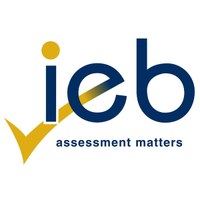The Independent Examinations Board (IEB) is a South African assessment agency that conducts assessment for schooling and adult education.
Our history dictates to a large extent the ethos and values of the IEB. When the Joint Matriculation Board (JMB), as the only assessment body in South Africa to offer examinations for non-racial schools, relinquished its examination function in 1989, a number of heads at independent schools came together to found the IEB.
The IEB's primary reason for being was to ensure that there was at least one non-racial assessment body at Grade 12 during the time of apartheid to serve progressive schools that stood in opposition to the apartheid policies of the day.
The IEB is accredited by Umalusi for examinations in schooling and adult education. It has also been appointed as the Assessment Quality Partner for the Quality Council for Trades and Occupations (QCTO) for Foundational Learning Competence, a requirement in occupational qualifications at levels 3 and 4 of the NQF. The IEB has a training unit, IEB Assessment in Education and Training, which is accredited by the ETDP SETA.
The IEB has been registered by the Department of Social Development as a non-profit organisation. Every product and service rendered by the IEB is self-sufficient. Its directors serve the organisation without remuneration.
Today the IEB, whilst still maintaining its independence, is a leader in innovative assessments that are relevant to South Africa. The IEB has also established itself as a significant role-player and a key partner to government in building our education system in a democratic South Africa.
The IEB works in an educational environment of extremes – state and independent schools; well-resourced and under-resourced schools; exceptional teaching that compares very well with the best in the world and classrooms in which, at best, teaching is synonymous with reading from a set of notes or a textbook, if a teacher is present at all; schools in which integrity and concern for a common good are overriding values and others where success is attained by fair means or foul, where values are secondary to one's own individual needs and desires. One can go on and on describing the range of diverse attitudes, situations and experiences evident in the education landscape in our country, in our region and on our continent.
Faced with the dilemmas that are education in South Africa, the staff and Board members of the IEB are clear that education is as much a philosophical undertaking, underpinned by social as well as educational values, as it is a technical exercise carried out by a professional body of experts.
The work of the IEB is underpinned by a commitment to the values of Integrity, respect, commitment and service, professionalism, communication, quality, teamwork.
The IEB supports the position that actively promoting quality education for every South African citizen is fundamental in establishing a just, open society based on democratic values, social justice and fundamental human rights, in which cultural diversity is appreciated and embraced.
In our assessments and related activities we attempt to encourage schools and teachers to provide learners with the opportunities to explore topics, participate in activities and be exposed to discussions and debates that develop the kinds of skills and attitudes we believe every modern member of our society needs to have mastered. Our complex world and our own very complex society demands citizens who are not only courageous but able to determine what we need and how to bring that better world into being.
The IEB makes every effort to ensure that our assessments are globally competitive and that our learners have access to assessments that compete at the highest level. We believe that given the opportunity, our learners from our region are capable of achieving along with the top global achievers; this is the driver for the IEB Advanced programmes and our participation in international benchmark tests. It is this belief in the quality of our learners and our nation that inspires the IEB to try and influence the educational experience beyond assessment. It is with this backdrop that the IEB presents this statement of what it stands for as an educational institution.
The vision of the IEB is to advance quality teaching and learning in South Africa through an assessment process of integrity, innovation and international comparability. The IEB is cognisant that assessment is essential in developing learners who are responsible South African citizens, able to negotiate the challenges of a global world. Through our assessments, we are motivated to develop learners who are:
- critical users of information
- ethical reasoners
- problem solvers
- creative and reflective thinkers
- lifelong learners
- society members respectful of diversity, particularly in the Southern African context
- active citizens who are committed to upholding the principles of the South African Constitution and the wellbeing of all people
The IEB supports the position that actively promoting quality education for every South African citizen is fundamental in establishing a just, open society based on democratic values, social justice and fundamental human rights, in which cultural diversity is appreciated and embraced.
The IEB's mission is to make a significant, on-going contribution to human resource development through the design, delivery and promotion of a wide range of high quality, affordable assessment products and services to all sectors.
The work of the IEB is underpinned by a commitment to the following values: integrity, respect, commitment and service, professionalism, communication, quality and teamwork.
Website
Contact Person
Estelle Nel
+27 11 483 9700
nele@ieb.co.za

